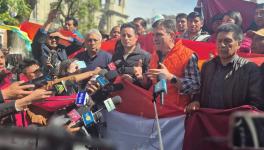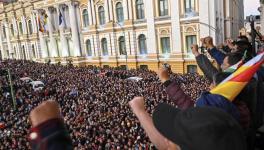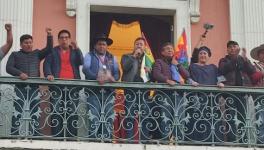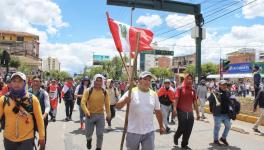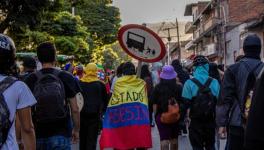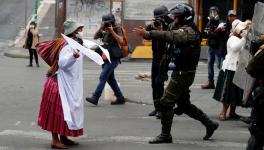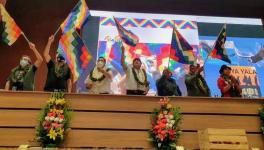Bolivian Judge Orders 4 Months of Preventive Detention for Coup Leader Jeanine Áñez
A Bolivian judge ordered four months of preventive detention for the leader of the coup-installed regime, Jeanine Áñez, on March 14. Photo: Kawsachun News
Bolivian criminal investigating judge, Regina Santa Cruz, on March 14, ordered four months of preventive detention for the leader of the coup-installed regime, Jeanine Áñez. The order came a day after she was arrested by authorities for her involvement in the US-backed coup d’état carried out by the country’s right-wing forces and supported by the armed forces against the democratically-elected president Evo Morales on November 10, 2019.
Judge Santa Cruz also ordered four months of preventative detention for two of her former ministers: Álvaro Coimbra, the former Minister of Justice, and Rodrigo Guzmán, the former Energy Minister, who were also arrested on March 13.
On March 12, the Prosecutor’s Office ordered their detention and charged them with “terrorism, sedition and conspiracy.” On March 13, the Prosecutor’s Office requested 6 months of detention, stressing that there is a high risk of escape of those involved, and that they could influence important witnesses if they remain free.
On March 13, during a virtual hearing, Judge Santa Cruz backed the prosecutor’s office’s request and determined the measure after considering the fact that Áñez, at the time of her detention, tried to hide in a box to avoid arrest in an attempt to flee the country. However, the judge decided that six months were excessive for the investigation period.
Añez will be held in the Obrajes women’s prison, while Coimbra and Guzmán will be in the San Pedro prison in the capital La Paz.
Áñez, her supporters and right-wing leaders have denounced her arrest as “an act of political persecution.” This claim has received support from the Organization of American States (OAS) which was denounced widely for its participation in the 2019 coup d’état. In a statement released on March 15, the OAS expressed “concern about the abuse of judicial mechanisms that once again they have become repressive instruments of the ruling party.” Many have pointed out the hypocrisy in the statement given that while members of the Movement Towards Socialism (MAS) party were being hunted down by right-wing vigilantes during the coup and after and members of the party were being slapped with heavy charges for organizing protests against the coup, the OAS was silent.
On March 14, the current Minister of Justice, Iván Lima, told Kawsachun News that the government has invited the Inter-American Commission on Human Rights (IACHR) to monitor the due process in the trial against Áñez and officials of her adminsterion.
The coup
After the general elections of October 20, 2019, in which Morales of the progressive Movement Towards Socialism (MAS) obtained over 10% more votes than his closest rival, which was necessary for victory, the country’s opposition refused to accept the results alleging that an electoral fraud had been committed, and began violent mobilizations demanding Morales’ resignation. The Organization of American States (OAS) and its secretary general Luis Almagro, supported the Bolivian far-right’s claims and their call for the annulling of the elections.
Amid an escalation of violent protests, threats and intimidation against him and his family members, and pressure from the Armed Forces and the National Police, Morales was forced to resign and leave the country to save his life.
Following Morales’ resignation and departure, on November 12, in a session of Congress that met without quorum, right-wing legislator Áñez declared herself “interim president” of Bolivia.
Violent repression and human right violations
Immediately following the coup and illegal seizure of power, hundreds of thousands of Indigenous people, members of social movements and trade unions began mobilizing across the country to resist the coup. In response to the popular uprising, Añez’s regime unleashed an unprecedented level of repression against those who took to the streets in rejection of the coup.
Añez authorized the security forces to use extreme force to suppress social protests. She even passed a decree that exempted from criminal liability the military personnel who “participate in the operations for the restoration of order and public stability.”
The coup-supporting Police Force and Armed Forces brutally repressed the multitudinous mobilizations, using tear gas, arresting protesters, carrying out violent house raids, and firing live bullets against protesters. This included the two massacres of Sacaba and Senkata, in which 11 and 12 protesters, respectively, were killed, and hundreds were gravely injured.
The interim government also intensified selective prosecution of political and social leaders. The de-facto government institutionalized racism and prohibited public servants from wearing traditional Indigenous dresses during working days.
The regime also tried to impede the communication about the reality of what was happening in the country. The local press was censored and foreign correspondents were harassed and attacked.
The IACHR and other international human rights organizations verified that Añez’s government committed a number of human rights violations post-coup. According to the IACHR, 36 people lost their lives in different regions of the country during various violent repression operations by security forces and confrontations between for and against coup supporters following the assumption of office by Áñez.
Courtesy: Peoples Dispatch
Get the latest reports & analysis with people's perspective on Protests, movements & deep analytical videos, discussions of the current affairs in your Telegram app. Subscribe to NewsClick's Telegram channel & get Real-Time updates on stories, as they get published on our website.









